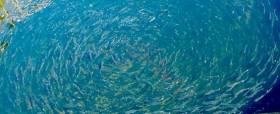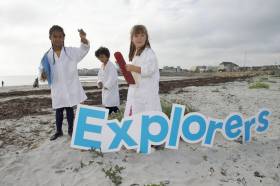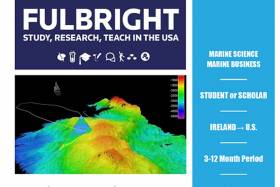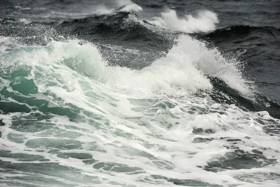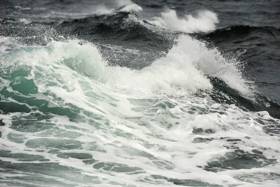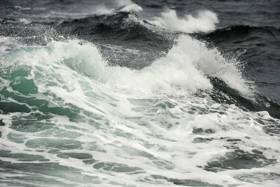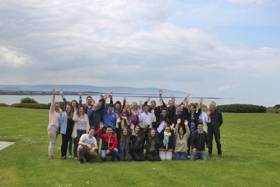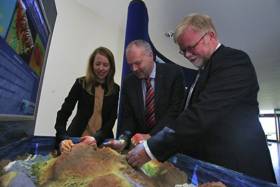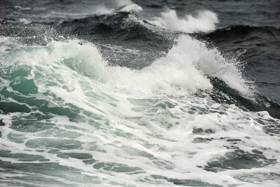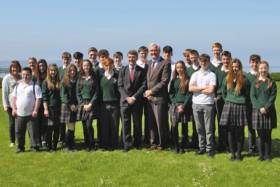Displaying items by tag: Marine Institute
Campaigners Fear ‘Back Door’ Salmon Farming Via Galway Bay Test Site
#FishFarm - Could proposals for the Galway Bay Marine and Renewable Energy Test Site provide a back door for fish farming in the bay?
That’s the concern of local campaigners after a Statutory Instrument was enacted earlier this month that changes the licensing laws for salmon farming for research purposes, as the Connacht Tribune reports.
The new law allows for salmon farms under 50 tonnes to operate without an Environmental Impact Assessment – one of the issues before the withdrawl last year of controversial plans for what would have been one of the largest aquaculture projects in Europe off the Aran Islands.
According to Billy Smyth, chair of campaign group Galway Bay Against Salmon Cages, the move confirms suspicions that the Marine Institute test site off Spiddal could be used for fish farming.
“Let the Marine Institute just ask the Norwegians for the results of their research and save money,” he said.
The public consultation on the foreshore lease application for upgrades to the present test site closed earlier this month.
But contributions are still being sought on a new strategy for coastal communities with fishing and fish farming interests under the FLAG West scheme, following a series of public meetings in Co Galway last week. Galway Bay FM has more HERE.
Primary Schools' Marine Education Programme Expands
#MarineScience - The Marine Institute’s Explorers Education Programme is growing and is now available in Galway, Clare, Mayo, Cork and Waterford, delivered by centres including Galway Atlantaquaria, Loop Head Summer Hedge School, Redrose Developments, Lifetime Lab and Oceanic Surf School and the Marine Education Centre.
The centres will be introducing marine-based education modules to more than 3,000 primary school children during the next school year (2016-2017), promoting the importance of our ocean through saltwater aquariums in classrooms, seashore safaris, marine projects, marine workshops and special science and art projects.
Marine Institute chief executive Dr Peter Heffernan congratulated the centres on joining the Explorers Education Programme, highlighting that “their expertise and enthusiasm for our oceans provides an important platform for teaching marine themes in the classroom and helps to support and reconnect teachers and their students with the marine environment.
“As an Island nation with a seabed territory 10 times greater than the size of the island of Ireland, it is fundamental that we realise the value, opportunities and social benefits the ocean provides us.
"On a daily basis the ocean produces over half the oxygen we breath, provides us with food and supports the tiniest microscopic plants to the largest animals on earth. It is therefore essential that we learn about the influence the ocean has on us and the influence we have on the ocean."
As part of the development of the programme, Galway Atlantaquaria – Ireland's national aquarium – has been contracted to provide professional development training and workshops for teachers in schools as well as assist with workshops for trainee teachers at DCU-St Patrick’s, introducing marine themes into the curriculum.
“Recognising the unique position teachers have to inspire their students, the institute welcomes the opportunity to help teachers generate curiosity among their students to learn more about our ocean wealth as well as realize some of the amazing marine career opportunities,” said Cushla Dromgool-Regan, responsible for the strategic development of education at the Marine Institute.
Details of Explorers Education Programme modules and the centre contacts are available at www.explorers.ie. Booking to take part in the modules is essential and teachers should contact the relevant outreach centres listed on the site.
Centres selected to represent the Explorers Education Programme were chosen in line with the public sector procurement guidelines. The programme is supported by the Marine Institute and is funded under the Marine Research Programme by the Irish Government.
Applications Open To Marine Researchers For Fulbright-Marine Institute Award
#MarineScience - The Fulbright Commission and the Marine Institute are offering a unique opportunity for an Irish PhD candidate or scholar to travel to the US to research in the fields of marine science or marine-related business sector.
The commission is particularly interested in receiving applications for this award from candidates who are exploring:
- Marine Sensor Technologies and Observation Systems
- Maritime Economics
- Marine Spatial Planning, Maritime Law and Security
- Renewable Ocean Energy
- Marine Biotechnology (including Functional Foods)
- Marine Environment
- Oceanographic Modelling
- Shipping, Seafood Safety, and
- Ecosystems-based Fisheries Management
Fulbright Irish Awards offer funding and administrative support for Irish citizens and EU citizens (resident in Ireland for more than three years) to study, research or teach/lecture in the USA for a period of four months or one semester, up to one year.
The application period is now open with a deadline is 4pm on Friday 28 October.
Details of the 2017-2018 Fulbright-Marine Institute Award to conduct postgraduate research in the US in all fields of marine science or marine-related business sector are available at the Marine Institute website HERE.
Fulbright staff will hold a webinar giving general information on the Fulbright Irish Awards at 1pm next Tuesday 13 September – email [email protected] if you would like to register.
Fulbright award managers can be reached on 01 660 7670 or at [email protected] to answer application queries. Fulbright Ireland ambassadors are also available to give on-campus support.
Locals Express Fears As Deadline Draws Near On Galway Bay Marine Test Site Consultation
#SeaPower - Fears over loss of access to generations-old seaweed harvesting grounds and millennia-old archaeological finds have been expressed by locals in the consultation on the new Galway Bay Marine and Renewable Energy Test Site, which closes next Friday 9 September.
According to The Irish Times, community activists in Spiddal have accused the State agency responsible of a "lack of transparency" over its intentions for a long-term lease over the foreshore site on the Connemara coast that's already home to the new SmartBay observatory.
Locals have also expressed concerns that the new facility would be used for power generation and not just for testing of quarter-scale prototypes, that it would cover an area some "30 times the size of Croke Park", and that the main test wind turbine would reach a height of 35 metres.
"We run a regatta in Spiddal every year of Galway hookers and it is right on the line of the regatta," said an organiser of the public meeting held in Spiddal last Monday 22 August. "There was no environment impact statement; there was no consultation with the likes of us."
#SeaPower - The public consultation period for the Marine Institute’s foreshore lease application to upgrade the Galway Bay Marine and Renewable Energy Test Site has been extended once more, until 5pm on Friday 9 September.
This latest extension follows the public meeting on Thursday 21 July in the Connemara Coast Hotel, during which some participants requested more time to allow informed submissions on the lease application.
It also comes after complaints from Galway West TD Catherine Connolly over a lack of response from Local Government Minister Simon Coveney over the issue, as the Galway Advertiser reports.
The meeting was the third public meeting held as part of the consultation on the foreshore lease application to upgrade test and demonstration facilities at the Galway Bay Marine and Renewable Energy Test Site.
The Marine Institute applied in April to the then Department of the Environment, Community and Local Government for a foreshore lease for the site where prototype marine renewable energy technology can be tested at reduced scale to determine viability in an ocean environment.
All relevant documents remain on viewing until the new deadline.
Some 25 submissions have been received as of the previous deadline of 2 August, according to Galway Bay FM.
Public Meeting In Connemara On Galway Bay Marine Test Site
#SeaPower - The Marine Institute will host a third public information meeting on the Galway Bay Marine and Renewable Energy Test Site next Thursday 21 July at 7:30pm in the Connemara Coast Hotel in Furbo, Co Galway.
The meeting is part of the public consultation to ensure full information is provided on the Marine Institute’s foreshore lease application to upgrade test and demonstration facilities at the Galway Bay Marine and Renewable Energy Test Site.
The Marine Institute and the Sustainable Energy Authority of Ireland will provide information on the background to the lease application and the scope of the proposed upgrade and address questions raised by the public ahead of the new deadline for submissions, which is Tuesday 2 August.
As previously reported on Afloat.ie, the application document and relevant maps, plans reports and drawings are available from the Department of the Environment's website, and are also available for viewing in Salthill and Spiddal till the deadline. Information on the consultation is also available in Irish.
Marine Institute Summer Bursar Programme Returns
#MarineInstitute - The annual Marine Institute bursar programme begins this month with 28 students from various third-level institutions starting summer work placements.
Over eight weeks, the students will work in a variety of areas including salmon assessments, fish sampling at the ports, shellfish assessment, maritime economics, education, application development and oceanographic sciences.
"The work experience programme gives students from a wide variety of disciplines a chance to further their knowledge and research in their particular area of interest and to expand their professional networks within Ireland and internationally," said Helen McCormick, senior laboratory analyst at the Marine Institute and co-ordinator of the bursar programme.
As previously reported on Afloat.ie, the placements will give students practical and hands-on experience at different locations around Ireland, including the offices and laboratories at the Marine Institute, Galway; Wilton Place, Dublin; and Burrishoole Catchment, Newport, Co Mayo. Some students will also be located at other locations around the country in counties Cork, Limerick, Derry and Waterford.
The summer bursar programme has been ongoing since the 1960s and is a highly sought-after work experience programme in the marine science sector and continues to offer a promising gateway into the expanding areas of marine science and research in Ireland.
Dr Peter Heffernan, CEO of the Marine Institute, congratulated all successful bursars on this year's programme. "The Institute is delighted to support this excellent learning opportunity for Irish students as well as highlight the future employment opportunities for undergraduates and postgraduates within the marine sector," he said.
#OurOceanWealth - Industry leaders, policy makers, researchers and maritime entrepreneurs will come together for the third Our Ocean Wealth conference on Friday 1 July in NUIG to discuss marine innovation, marine spatial planning, healthy ocean ecosystems and sustainability, the Marine Institute announced today (Tuesday 7 June).
The theme of this year's conference is 'Into the Blue – Innovating for our Marine Future', and key speakers include Vice Admiral Mark Mellett, head of the Irish Defence Forces; European Commission director general and research head of marine resources Sigi Gruber; Gerald Fleming of Met Éireann; Craig McLean of the US National Ocean & Atmospheric Administration; and Linda Rosborough of Marine Scotland.
New Marine Minister Micheal Creed will also give his first formal address on the marine economy at the conference.
"This conference will be an opportunity to reflect on the progress and achievements in implementing Harnessing Our Ocean Wealth – An Integrated Marine Plan for Ireland," he said. "I'm looking forward to hearing from thought leaders and innovators across a broad and exciting maritime sphere and to join the discussion on innovating for our marine future."
Speaking at the launch of the conference schedule, Marine Institute CEO Dr Peter Heffernan said: "While there are many events internationally that look at specific areas of our marine economy, from shipping and transport to energy, the Our Ocean Wealth annual conference is unique in that it brings global experts in this industry together to discuss the future opportunities and challenges for the blue economy.
"This holistic approach to the global maritime economy, and our focus on Ireland's blue economy, makes it a must-attend event for anyone working in or involved in marine-related activities."
Delegates will also hear from Irish companies leading in innovation such as OpenHydro Group Ltd, which has just installed its second tidal turbine off the north west coast of France due to connect to the grid this summer, in what will be a world first for the tidal energy industry.
Several hundred people are expected to attend the Our Ocean Wealth conference, which is being held in Galway this year as part of SeaFest, Ireland's national maritime festival, from 30 June to 3 July.
A number of other blue economy events are also taking place to coincide with the conference, including a Sea Change Researchers Workshop at the Marine Institute, the Digital Ocean event at the Meyrick Hotel and the BIM National Seafood Conference which all take place on Thursday 30 June.
#SeaPower - A public consultation is underway on the Marine Institute’s application for a foreshore lease to upgrade the Galway Bay Marine and Renewable Energy Test Site.
The Marine Institute has applied to the Department of the Environment, Community and Local Government for a foreshore lease for the site where prototype marine renewable energy technology can be tested at reduced scale to determine viability in an ocean environment.
Observations are invited on the foreshore lease application, which outlines plans to upgrade the current infrastructure and facilitate the deployment of a wider range of marine renewable energy devices and novel sensor technologies at the test site.
The Galway Bay Marine and Renewable Energy Test Site has been in operation since 2006 when it was established by the Marine Institute and the Sustainable Energy Authority of Ireland. The purpose of the site is to allow marine technology innovators to test the viability of small scale prototypes in an ocean environment.
A copy of the application and relevant maps, plans, reports and drawings are available to download HERE from the Department of the Environment, Community and Local Government’s website.
Copies of these documents are also available for viewing at Salthill Garda Station, Spiddal Public Library and Comhlacht Forbartha An Spideal Teo until 5pm on Friday 17 June.
Should you wish to make a submission on the lease applications you should do so in writing, giving reasons, within 21 working days of publication of this Notice (Friday 20 May), quoting ref FS 006566, to the Foreshore Unit, Department of the Environment, Community and Local Government, Newtown Road, Wexford or [email protected]. The closing date for submissions is close of business on Friday 17 June.
The Marine Institute plans to hold a public information evening in early June as part of the consultation process, details of which will be announced in due course.
For further information please contact Alan Berry at [email protected]
#MarineInstitute - Canadian Ambassador to Ireland Kevin Vickers visited the Marine Institute in Oranmore this week to hear about the ongoing marine science and research collaborations between the Ireland and Canada.
These include a survey on the Celtic Explorer, which left St John's in Newfoundland last Wednesday 11 May with scientists from Ireland, Canada and the USA onboard to map a transect of the Atlantic seabed.
Ambassador Vickers also had the opportunity to meet local Transition Year students from Calasanctius Secondary School who were visiting the Marine Institute to learn about marine research, potential career opportunities and to promote ocean literacy. He talked to them about the longstanding links between Ireland and Newfoundland.
Marine Institute chief executive Dr Peter Heffernan commented: "Co-operation between our nations is key to improving our ocean wealth and promoting the sustainable management of its resources. It's hugely important for Ireland and brings us closer to achieving the goals of the Galway Statement on Atlantic Ocean Cooperation signed here at the Marine Institute Galway in May 2013 by the EU, USA and Canada.
"The current survey on the Celtic Explorer is called TRASNA [the Irish word for crossing] and is the fourth seabed mapping survey to take place under the Atlantic Ocean Research Alliance," he added.
The Marine Institute is leading the Horizon 2020 funded project, the Atlantic Ocean Research Alliance Co-ordination and Support Action, to support the implementation of the Galway Statement.
Meanwhile, the visiting TY students were given an overview of the wide-ranging research areas within the institute by Dr Paul Connolly, director of fisheries ecosystems and advisory services.
The students toured the fish aging laboratories to learn how scientists use the otolith, or earbone, of a fish to discover its age and how this process is used for assessing fish stocks so that we know the sustainable limits for fishing.
They also learned about ocean acidification and how climate change is being affected by the increase of CO2 in our oceans with talk by Dr Triona McGrath.
The INFOMAR team demonstrated their work on seabed mapping using the latest technology, explaining the importance of topography, geology and seabed mapping using Ireland's first augmented reality sandbox.


























